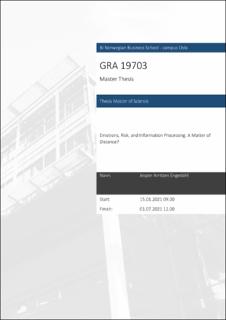Emotions, Risk, and Information Processing: A Matter of Distance?
Master thesis
Permanent lenke
https://hdl.handle.net/11250/2826055Utgivelsesdato
2021Metadata
Vis full innførselSamlinger
- Master of Science [1621]
Sammendrag
Emotions play an important role in shaping judgements and decisions involving
risk. More recently, researchers have paid more attention to different ways in which
people can manage their emotions, and how this in turn affects their decisions. The
present thesis examined how reappraisal – a general strategy of emotion regulation
– moderates the influence of fear and anger on risk-taking and information
processing. The thesis examined a specific tactic of reappraisal known as
psychological distancing. Participants were asked to recall and describe an
emotional event (fear vs. anger) from either an immersed or distant perspective.
Next, participants completed a risky decision-making task (the Iowa Gambling
Task). As predicted, anger increased risk-taking behavior, while fear decreased
risk-taking. Importantly, this pattern of results was only found among participants
who adopted an immersed perspective, while recalling an emotional event.
Interestingly, the effects of fear and anger reversed among the participants who
adopted distant perspective. Finally, distancing also moderated the effect of
emotions on information processing, such that distancing reduced the positive effect
of emotion on intuitive processing. The results, implications and limitations are
discussed.
Beskrivelse
Masteroppgave(MSc) in Master of Science in Leadership and Organizational Psychology - Handelshøyskolen BI, 2021
